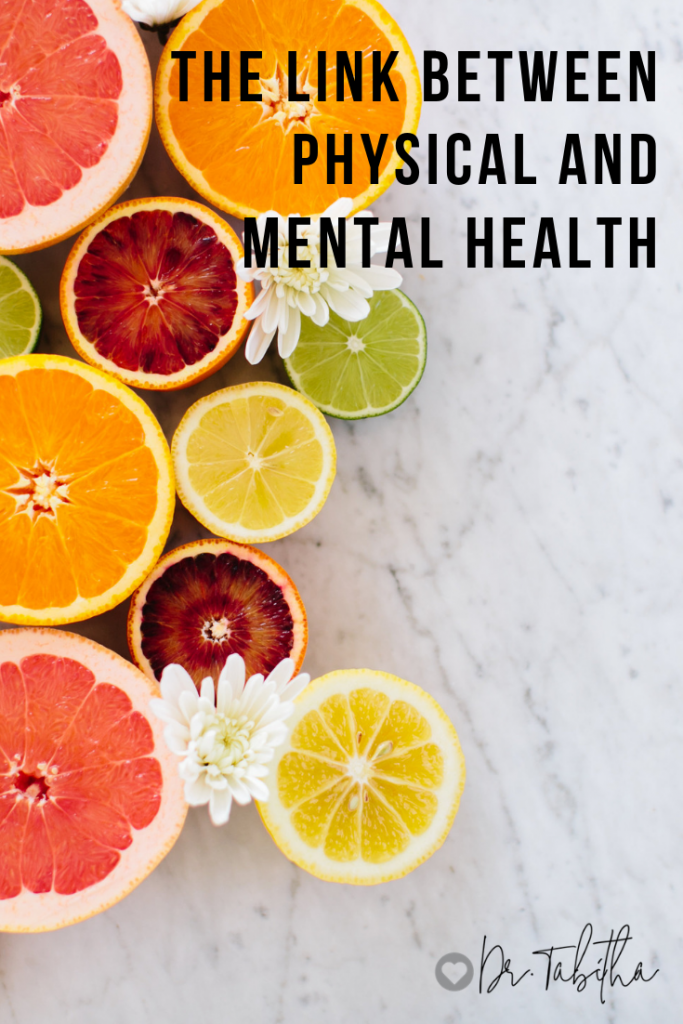
A friend of mine was recently complaining about her shoulder hurting while we were having coffee one morning. When I asked how she was, she told me life was pretty good. She was enjoying time with her kids and her new baby. Things were busy at work but she was feeling good about the job she was doing and happy with the money she was making. She reported things were well in her marriage. As I listened to her talk, I heard her talk about work and managing her home, marriage and two small children – it sounded like a lot to me. When I asked if maybe her shoulder pain was related to stress, she seemed surprised that there could be a link between physical and mental health. She agreed maybe her body was telling her something.
Is there a link between physical and mental health?
We often try to separate our physical and mental health, when in fact, they are very much connected. What’s more important – physical or mental health? A recent study showed that depression alone increases risk of death from heart disease by 67% and increases death from cancer by 50%. Those are some staggering statistics. The World Health Organization (WHO) good defines health as a state of complete social, physical and mental well-being and not merely the absence of disease or infirmity.
There is no health without mental health.
It is fairly evident that in order to have good mental health, you must be taking care of your physical health and vice versa. Have you ever gotten sick and then felt extra cranky or more emotional? Alternatively, people that experience mood disturbances or overwhelming stress will also likely experience physical symptoms as a result.
Overall wellness can be viewed as a complete picture of spiritual health, physical and mental health. If one or more of these is off, then your whole sense of wellness is off balance. The solution may seem elusive or overwhelming but the easiest way to get back in sync, is to keep things simple and get back to basics.
11 Simple Ways to Improve your Overall Health
Physical Health:
Eat a balanced diet.
Sometimes this is as simple as making sure you are eating three times a day. Or adding in servings of fruits and vegetables. Make sure that you are fueling your body so that it can work at its full potential. Even if eating feels counter-intuitive when you are experiencing depression or anxiety, the truth is that skipping out on a healthy meal actually makes those symptoms worse.
Move each day.
Notice that I didn’t say exercise. At times, trying to fit in formal exercise can be overwhelming so just commit to moving each day! Go for a walk, dance in the kitchen, play with your kids or pets in the backyard; any of these are good options to get you moving. Having some movement in your day can vastly improve your sleep and quality of life. Through exercise you are giving your body a chance to release stress and tension, in addition to improving your cardiovascular health – thus improving both your physical and mental health.
Reduce or Eliminate Alcohol.
If you consume any alcoholic beverage it is recommended that you do so before 5 P.M. or it can hinder your sleep pattern. You might consider giving it up all together and see if it makes a noticeable improvement in your mood and sleep.
Get sleep.
Sleep enough each day to wake, feeling rested and ready to conquer the day. Most recommendations are 7-9 hours per night for adults. You may feel like you can get by with less than 8 hours of sleep a night, but statistics show that getting less than 8 hours can led to higher stress and anxiety levels.
Check in with your doctor.
Make sure to get a yearly physical to voice any concerns you have and make sure that you maintain good physical health. Sometimes deficiencies and physical ailments can affect your mood and mental health.
Mental/Emotional Health:
Be positive and thankful.
Having a heart of gratitude and looking for the positive side of any situation is one of the most beneficial aspects to good mental health. Start a gratitude journal, give someone a compliment, share the best part of your day; all of these are good activities to get you started. Try to shift your perspective toward seeking opportunities for hope and growth in any negative situation.
Practice mindfulness.
Be all present in each moment. This is valuable to slow down and give yourself the opportunity to cherish each moment that you have. Notice the things around you, using all five of your senses. There are now tons of apps available on your phone with relaxing music and guided meditations. Try a yoga class to address both your physical and mental health. You can check mindfulness and daily movement off your list.
Experience emotions.
Allow yourself to experience a full array of emotions. Make it okay to experience negative emotions rather than try to avoid or push them down. It is okay. Recognize that emotions come and emotions go, you will not be experiencing that emotion forever. It’s important to make space for negative emotions rather than stuffing them down and causing yourself to get sick or later explode. Likewise when you are having positive emotional experiences, enjoy them! It’s healthy to have a variety of emotions.
Seek Counseling.
Mental health professional possess the skills and resources needed to guide and equip you to cope with the daily stresses of life and those lingering past experiences that may continue to impact your physical and mental health.
Spiritual Health:
Connect with a higher power.
This world is not just about you. Connecting with something greater than ourselves is a powerful experience. Have somewhere to place your faith, hope and trust. That may look differently for each of this and that’s okay. Focus son what you are comfortable with – believing in God, Buddha, karma, the universe or even nature can help us feel humbled and grounded.
Practice prayer and/or meditation.
The act of stilling ourselves has become a chore that many do not make the time for. However, this is a great way to share our burdens with our higher power or to help quiet our own minds. Many find that after a session of meditation and prayer that they feel a peacefulness that lasts the rest of the day if not helping them shift their focus even longer term.
The Effects.
It’s no secret that our physical and mental health are connected. Negative emotions can cause physical changes in the body – surges in adrenaline, cortisol and other stress hormones, increased blood pressure, heart rate and muscle tension. Over time, as the body is constantly put into this “fight or flight” mode, the immune system may treat chronic stress or anger almost like a disease, triggering inflammation. In short, dwelling on and suppressing unprocessed thoughts and emotions can and will have short and long term effects on your body that will deprive you of experiencing all that life has to offer.
If your like most people you probably find it hard or even impossible to forget or “let go” of distressing thoughts and situations and your body is reaping the repercussions. The worst thing you can do is stress about stressing. If you find yourself stuck in a pattern of negative thinking and are having trouble shifting your expectations, disappointments and anxiety on your own, we can help you. Changing your mindset quite literally requires you to rewire your brain. It’s hard work and can’t be completed overnight or by yourself.
I highly recommend the team of therapists at Family Therapy Associates. They are great at helping people increase their emotional awareness and understand how their emotions impact their lives and relationships. They can help you find your way to greater happiness and overall wellbeing.
What are some helpful ways you’ve found to beat stress?






1 Comment
Leave your reply.